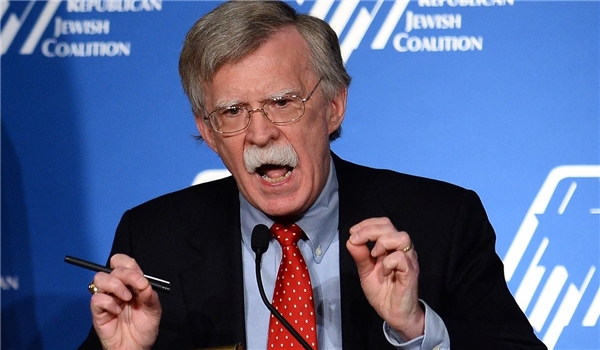
RNA - James Petras, a professor emeritus of sociology at Binghamton University in Binghamton, New York, made the remarks while discussing Bolton’s push to establish a coalition of Arab military forces in Syria to pave the way for an American withdrawal.
The White House is considering putting “a compelling reward” on the table in order to convince Arab states like Saudi Arabia to deploy forces to Syria, CNN reported, citing a source close to the White House.
The idea of creating an Arab force recently gained traction after Trump declared earlier this month that he wanted American troops out of Syria “very soon” and have other countries "take care of it."
The United States in particular is enlisting assistance from Egypt, Bahrain, Jordan, Kuwait, Oman, Qatar, Saudi Arabia and the United Arab Emirates should the US significantly reduce its troops size in Syria.
“There is debate and discussion and polemics going on in the Trump administration essentially between the most bellicose and belligerent faction led by John Bolton, who has never turned down an opportunity to bomb a country or engage in warfare, who is a notorious Zionist apologist and who is looking toward a confrontation between the United States and Russia… against Syria, against Iran and in another words any country that has an independent foreign policy,” Petras told on Wednesday.
According to the academic, Bolton had failed to convince US leadership into deepening the current US-led military intervention in Syria. So he was now looking for new ways to achieve this goal.
The US and its regional allies have backed militants opposed to the Syrian government since the conflict broke out in 2011.
Bolton recently called Egypt's acting intelligence chief, Abbas Kamel, to determine whether his country would be willing to deploy to Syria, according to CNN and The Wall Street Journal.
Mike Pompeo, Trump’s pick for secretary of state, is also involved in the initiative.
“Bolton has changed the context for US intervention, hoping to recruit the Middle eastern satellites of the United States, including Saudi Arabia, the [United Arab] Emirates, Egypt, Jordan and etc,” he argued.
The problem, however, was that none of these allies is in a position to help Bolton and Washington with their plans, Petras argued.
“[President Abdel Fattah] el-Sisi in Egypt is a military dictator, Saudi Arabia is unquestionably one of the worst offenders of human rights in the world and Jordan has never had a free election; the Emirates likewise!” he explained.
“So I think, essentially, this is a extreme position that Bolton has adopted but it is one that is extremely politically dangerous for the Trump administration and I think it may not have any significance as far as becoming the US foreign policy,” Petras concluded.
Source: Press TV
847/940